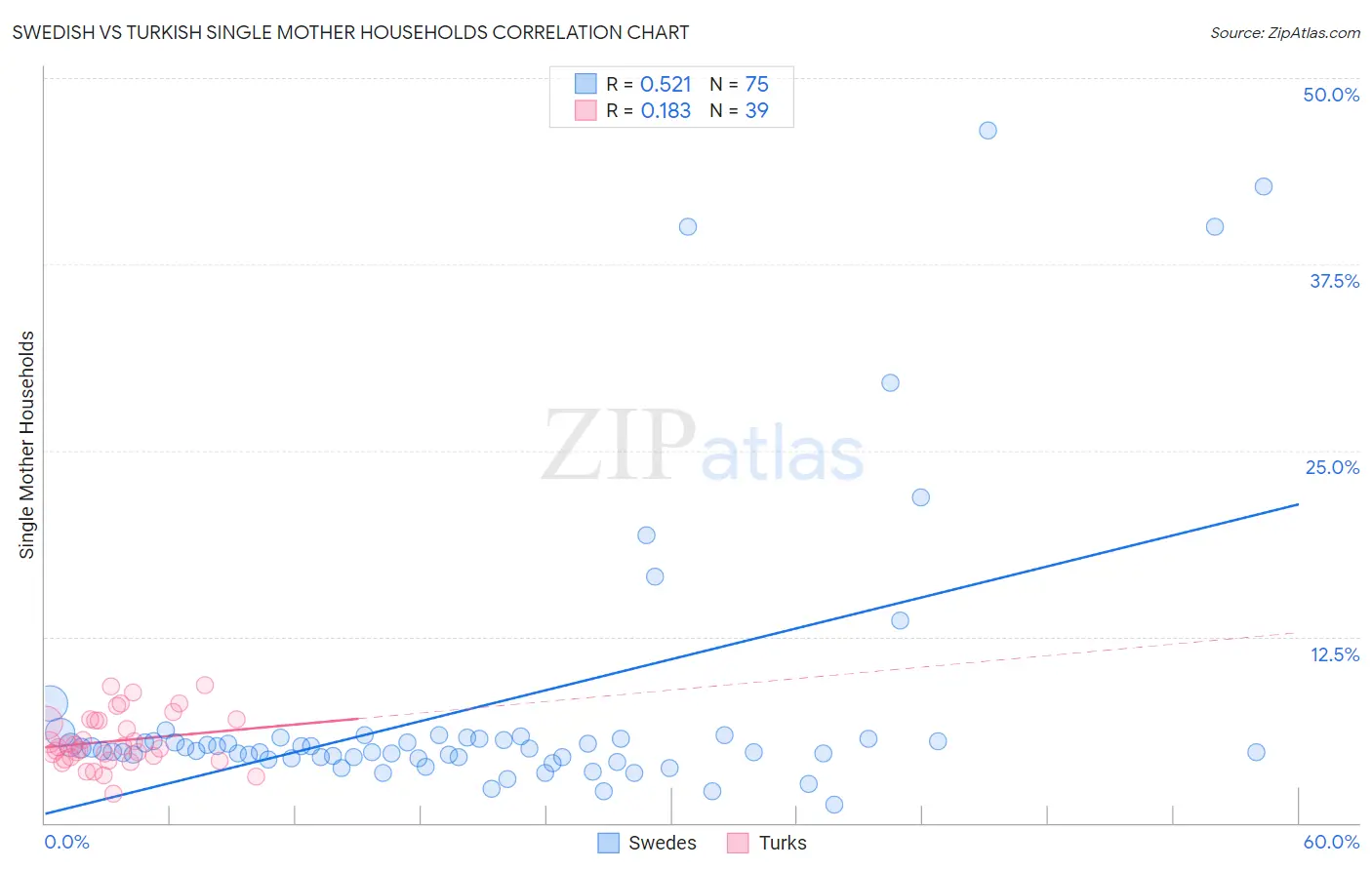Swedish vs Turkish Single Mother Households
COMPARE
Swedish
Turkish
Single Mother Households
Single Mother Households Comparison
Swedes
Turks
5.5%
SINGLE MOTHER HOUSEHOLDS
99.1/ 100
METRIC RATING
52nd/ 347
METRIC RANK
5.5%
SINGLE MOTHER HOUSEHOLDS
99.2/ 100
METRIC RATING
48th/ 347
METRIC RANK
Swedish vs Turkish Single Mother Households Correlation Chart
The statistical analysis conducted on geographies consisting of 535,069,304 people shows a substantial positive correlation between the proportion of Swedes and percentage of single mother households in the United States with a correlation coefficient (R) of 0.521 and weighted average of 5.5%. Similarly, the statistical analysis conducted on geographies consisting of 271,337,640 people shows a poor positive correlation between the proportion of Turks and percentage of single mother households in the United States with a correlation coefficient (R) of 0.183 and weighted average of 5.5%, a difference of 0.30%.

Single Mother Households Correlation Summary
| Measurement | Swedish | Turkish |
| Minimum | 1.3% | 1.9% |
| Maximum | 46.5% | 9.2% |
| Range | 45.2% | 7.3% |
| Mean | 7.7% | 5.5% |
| Median | 5.0% | 5.1% |
| Interquartile 25% (IQ1) | 4.4% | 4.3% |
| Interquartile 75% (IQ3) | 5.7% | 6.9% |
| Interquartile Range (IQR) | 1.3% | 2.6% |
| Standard Deviation (Sample) | 9.3% | 1.8% |
| Standard Deviation (Population) | 9.3% | 1.7% |
Demographics Similar to Swedes and Turks by Single Mother Households
In terms of single mother households, the demographic groups most similar to Swedes are Immigrants from Belarus (5.5%, a difference of 0.070%), Immigrants from Scotland (5.5%, a difference of 0.080%), Immigrants from Russia (5.5%, a difference of 0.10%), Immigrants from Lebanon (5.5%, a difference of 0.12%), and Immigrants from Latvia (5.5%, a difference of 0.27%). Similarly, the demographic groups most similar to Turks are Immigrants from Latvia (5.5%, a difference of 0.030%), Norwegian (5.5%, a difference of 0.20%), Immigrants from Scotland (5.5%, a difference of 0.22%), Immigrants from Belarus (5.5%, a difference of 0.24%), and Croatian (5.5%, a difference of 0.38%).
| Demographics | Rating | Rank | Single Mother Households |
| Estonians | 99.6 /100 | #40 | Exceptional 5.4% |
| Immigrants | Greece | 99.5 /100 | #41 | Exceptional 5.4% |
| Macedonians | 99.5 /100 | #42 | Exceptional 5.4% |
| Immigrants | South Central Asia | 99.5 /100 | #43 | Exceptional 5.4% |
| Lithuanians | 99.4 /100 | #44 | Exceptional 5.4% |
| Immigrants | Croatia | 99.4 /100 | #45 | Exceptional 5.4% |
| Croatians | 99.3 /100 | #46 | Exceptional 5.5% |
| Norwegians | 99.3 /100 | #47 | Exceptional 5.5% |
| Turks | 99.2 /100 | #48 | Exceptional 5.5% |
| Immigrants | Latvia | 99.2 /100 | #49 | Exceptional 5.5% |
| Immigrants | Scotland | 99.2 /100 | #50 | Exceptional 5.5% |
| Immigrants | Belarus | 99.2 /100 | #51 | Exceptional 5.5% |
| Swedes | 99.1 /100 | #52 | Exceptional 5.5% |
| Immigrants | Russia | 99.1 /100 | #53 | Exceptional 5.5% |
| Immigrants | Lebanon | 99.1 /100 | #54 | Exceptional 5.5% |
| Immigrants | Denmark | 99.1 /100 | #55 | Exceptional 5.5% |
| Immigrants | Romania | 99.0 /100 | #56 | Exceptional 5.5% |
| Immigrants | Europe | 99.0 /100 | #57 | Exceptional 5.5% |
| Danes | 98.9 /100 | #58 | Exceptional 5.5% |
| Luxembourgers | 98.7 /100 | #59 | Exceptional 5.6% |
| Immigrants | Norway | 98.7 /100 | #60 | Exceptional 5.6% |